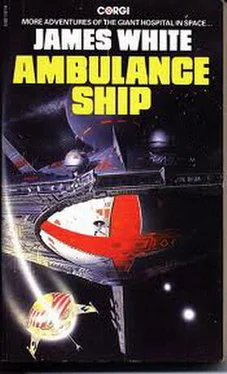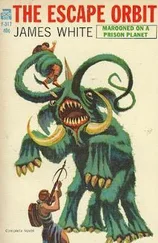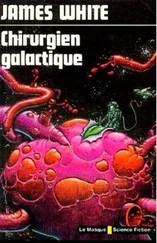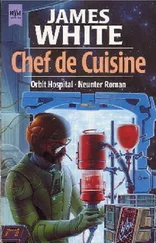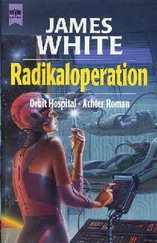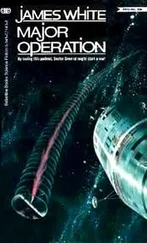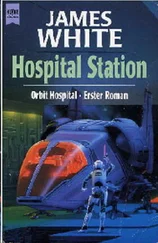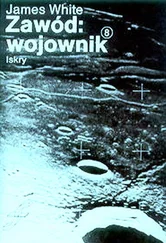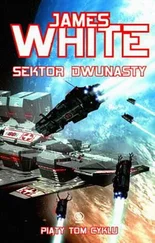“Well, sir,” Haslam replied hesitantly. “This may not mean anything, but we have headaches too.”
For a long time there was silence while the Captain and Conway thought about the two Rhabwar officers’ headaches. The men had been outside the ship at all times, making contact with the hull plating infrequently and then only through their magnetic boots and gauntlets-both of which had padded and insulated interiors capable of damping out mechanical vibration. Besides, sounds did not travel through a vacuum. Conway could think of nothing that would explain the two men’s headaches, but not so the Captain.
“Dodds,” Fletcher said suddenly to the officer he had left in the Rhabwar. “Run a sensor recheck for radiation emanating from this ship. It may not have been present until I started pushing buttons. Also, check for possibly harmful radiation associated with the nearby star cluster.”
Conway gave a nod of approval, which the Captain did not see. Even flat on his back with a thumping headache making it difficult to think and with one arm disappearing into an alien control pod in which an unguarded touch could cause anything from the lights going out to an unscheduled Jump into hyperspace, Fletcher was doing all right. But the sensor reading, according to Dodds, cleared the alien ship and the space around them of any trace of harmful radiation. They were still thinking about this when the timid voice of Prilicla broke the silence.
“Friend Conway,” called the empath, “I have delayed making this report until I was sure of my feelings, but there can no longer be any doubt. The condition of both survivors is improving steadily.”
“Thank you, Prilicla,” said Conway. “That will give us more time to think of a way of rescuing them.” To Fletcher, he added, “But why the sudden improvement?”
The Captain looked at the corridor cage and its outgrowth of furiously waving and jabbing metal and said “Could that have anything to do with it?”
“I don’t know,” said Conway, grinning in relief because the chances of a successful rescue had increased. “Certainly the noise alone is fit to wake the nearly dead.”
The Captain looked disapprovingly at him, plainly unable to see anything funny in the remark or the situation. Very seriously, he said, “I have checked and rechecked all of the flat rocker switches within reach. That particular form of actuator is the only kind suited to the short feeler pads possessed by the blind ones, because as manipulators the pads lack strength and leverage. But I have found something that feels like a lever, several inches long and terminating in a narrow reverse-conical handle. The cone is hollow and is probably designed to accommodate the tip of the blind one’s horn or sting. The lever is positioned at a forty-five-degree angle to its seating, which is the limit of its travel in the up direction. I intend moving it downwards.
“In case something calamitous happens as a result, we should seal our helmets,” Fletcher added. He closed his helmet visor and replaced the gauntlet he had removed earlier. Then he reached inside the opening without hesitation, obviously knowing exactly where his hand was going.
In the corridor cage all mechanical activity ceased abruptly. The silence was so complete that when someone scraped a magnetic boot against the outer hull the noise made Conway start. The Captain was smiling as he got to his feet and opened his visor again.
“The survivors are at the other end of this corridor, Doctor,” he said, then added, “if we can just get to them.”
But they found it completely impossible to wriggle through the thicket of projecting metal rods and bars. Even when the Captain took off his spacesuit to try it, he was successful only in collecting a number of cuts and abrasions. Disappointed, Fletcher climbed into his suit again and began attacking the metal projections with his cutter. But the metal was tough and required several seconds at maximum power before each metal bar was burned through. There were so many of the things it was like weeding a metal garden a stalk at a time, the Captain observed crossly. He had cleared less than two meters of the corridor cage when they were forced back to the airlock because of the buildup of heat.
“It’s no good,” said the Captain. “We can cut a way through to them, but only in short stages with lengthy delays in between to allow the excess heat to dissipate by conduction through the fabric of the ship and to radiate into space. There is also the danger that the heat might melt the insulation on some of their power-control circuitry, with unknown results.”
He tapped the wall beside him with his fist, so hard that it might almost have been a display of temper. “Emptying the storage spaces of nutrient soil would also be a long job, necessitating as it would the movement of the soil in installments from the storage spaces to the corridor to the lock and out, and we have no idea what structural problems could then arise inside those compartments. I’m beginning to think the only thing to do is cut a way in from outside. But there are problems there, too …
Cutting down to the survivors through the double hull of the ship would generate a lot of heat, especially inside the portable lock they would have to use to guard against accidentally depressurizing the vessel. Once again, lengthy delays would be required to allow the heat to radiate away, although the process would be faster since they would already be on the outer hull. There was also the problem of cutting through the mechanical linkages to the bars and pistons projecting into the corridor, which would tend to generate a lot of heat inside the ship, heat which might have an adverse effect on the survivors. The only advantage was that they would not run the risk of being beaten to death by metal bars if as a result of their cutting operations the system switched itself on again.
… And by the way, Doctor,” Fletcher added, changing from his lecturing tone, “my headache is fading.”
Conway was telling him that his own headache was diminishing as well when Prilicla broke into the conversation. “Friend Fletcher, I have been monitoring emotional radiation of the survivors since you halted the corridor mechanisms. Their condition has deteriorated steadily since then, and they are now in the state similar to that detected on our arrival, or perhaps a little worse. Friend Fletcher, we could easily lose them.”
“That … that doesn’t make sense!” the Captain burst out. He looked appealingly at Conway.
Conway could imagine Prilicla trembling inside its spacesuit at the Captain’s outburst and the emotional radiation accompanying it. But he could just barely imagine the effort it had taken for the little empath, who found it acutely painful to disagree with anyone, to speak as it had. “Perhaps not,” he said quickly to Fletcher, “but there is one way of finding out.”
Fletcher gave him an angry, puzzled look, but he moved to the control pod opening and a few seconds later the noise and mechanical activity in the corridor had returned. So had Conway’s headache.
Prilicla said, “The condition of the survivors is improving again.”
“How much did they improve last time?” asked Conway. “And would you be able to tell by their emotional radiation if one being was about to attack another?”
“Both survivors were fully conscious for a few minutes,” Prilicla replied. “Their radiation was so strong that I was able to reduce the area of uncertainty of their position. They are within two meters of each other, and neither of them was or is contemplating an attack.”
“Are you telling me,” the Captain said in a baffled tone, “that a fully conscious FSOJ and a blind one are as close together as that without the animal wanting to attack it?”
Читать дальше
